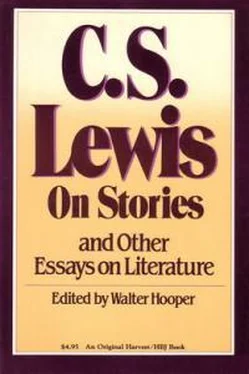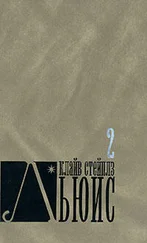I should like to be able to believe that I am here in a very small way contributing (for criticism does not always come later than practice) to the encouragement of a better school of prose story in England: of story that can mediate imaginative life to the masses while not being contemptible to the few. But perhaps this is not very likely. It must be admitted that the art of Story as I see it is a very difficult one. What its central difficulty is I have already hinted when I complained that in the War of the Worlds the idea that really matters becomes lost or blunted as the story gets under way. I must now add that there is a perpetual danger of this happening in all stories. To be stories at all they must be series of events: but it must be understood that this series—the plot , as we call it—is only really a net whereby to catch something else. The real theme may be, and perhaps usually is, something that has no sequence in it, something other than a process and much more like a state or quality. Giantship, otherness, the desolation of space, are examples that have crossed our path. The titles of some stories illustrate the point very well. The Well at the World's End —can a man write a story to that title? Can he find a series of events following one another in time which will really catch and fix and bring home to us all that we grasp at on merely hearing the six words? Can a man write a story on Atlantis—or is it better to leave the word to work on its own? And I must confess that the net very seldom does succeed in catching the bird. Morris in the Well at the World's End came near to success—quite near enough to make the book worth many readings. Yet, after all, the best moments of it come in the first half.
But it does sometimes succeed. In the works of the late E. R. Eddison it succeeds completely. You may like or dislike his invented worlds (I myself like that of The Worm Ouroboros and strongly dislike that of Mistress of Mistresses ) but there is here no quarrel between the theme and the articulation of the story. Every episode, every speech, helps to incarnate what the author is imagining. You could spare none of them. It takes the whole story to build up that strange blend of renaissance luxury and northern hardness. The secret here is largely the style, and especially the style of the dialogue. These proud, reckless, amorous people create themselves and the whole atmosphere of their world chiefly by talking. Mr. de la Mare also succeeds, partly by style and partly by never laying the cards on the table. Mr. David Lindsay, however, succeeds while writing a style which is at times (to be frank) abominable. He succeeds because his real theme is, like the plot, sequential, a thing in time, or quasi–time: a passionate spiritual journey. Charles Williams had the same advantage, but I do not mention his stories much here because they are hardly pure story in the sense we are now considering. They are, despite their free use of the supernatural, much closer to the novel; a believed religion, detailed character drawing, and even social satire all come in. The Hobbit escapes the danger of degenerating into mere plot and excitement by a very curious shift of tone. As the humour and homeliness of the early chapters, the sheer 'Hobbitry', dies away we pass insensibly into the world of epic. It is as if the battle of Toad Hall had become a serious heimsókn and Badger had begun to talk like Njal. Thus we lose one theme but find another. We kill—but not the same fox.
It may be asked why anyone should be encouraged to write a form in which the means are apparently so often at war with the end. But I am hardly suggesting that anyone who can write great poetry should write stories instead. I am rather suggesting what those whose work will in any case be a romance should aim at. And I do not think it unimportant that good work in this kind, even work less than perfectly good, can come where poetry will never come.
Shall I be thought whimsical if, in conclusion, I suggest that this internal tension in the heart of every story between the theme and the plot constitutes, after all, its chief resemblance to life? If story fails in that way does not life commit the same blunder? In real life, as in a story, something must happen. That is just the trouble. We grasp at a state and find only a succession of events in which the state is never quite embodied. The grand idea of finding Atlantis which stirs us in the first chapter of the adventure story is apt to be frittered away in mere excitement when the journey has once been begun. But so, in real life, the idea of adventure fades when the day–to–day details begin to happen. Nor is this merely because actual hardship and danger shoulder it aside. Other grand ideas—home–coming, reunion with a beloved—similarly elude our grasp. Suppose there is no disappointment; even so—well, you are here. But now, something must happen, and after that something else. All that happens may be delightful: but can any such series quite embody the sheer state of being which was what we wanted? If the author's plot is only a net, and usually an imperfect one, a net of time and event for catching what is not really a process at all, is life much more? I am not sure, on second thoughts, that the slow fading of the magic in The Well at the World's End is, after all, a blemish. It is an image of the truth. Art, indeed, may be expected to do what life cannot do: but so it has done. The bird has escaped us. But it was at least entangled in the net for several chapters. We saw it close and enjoyed the plumage. How many 'real lives' have nets that can do as much?
In life and art both, as it seems to me, we are always trying to catch in our net of successive moments something that is not successive. Whether in real life there is any doctor who can teach us how to do it, so that at last either the meshes will become fine enough to hold the bird, or we be so changed that we can throw our nets away and follow the bird to its own country, is not a question for this essay. But I think it is sometimes done—or very, very nearly done—in stories. I believe the effort to be well worth making.











